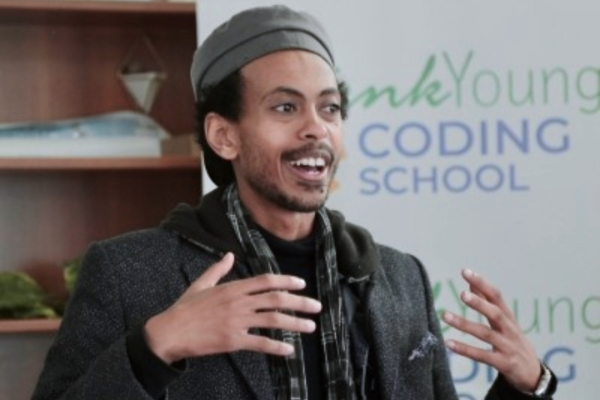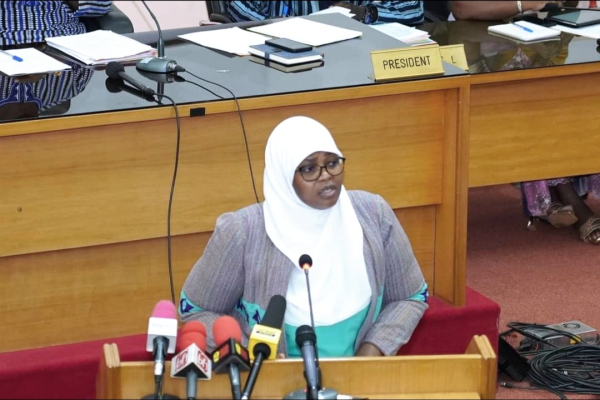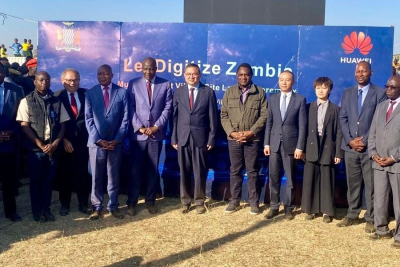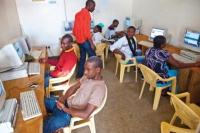Passionate about building Ethiopia's next generation of tech leaders, he uses fun and engaging methods to gradually introduce children to the world of computer coding.
Nathan Damtew (photo), a computer science graduate from Addis Ababa University, is an Ethiopian entrepreneur dedicated to teaching coding to children through his startup, BeBlocky, and learning center, Yenetta Code.
In 2018, Damtew founded BeBlocky, a gamified learning app that introduces young African children to the fundamentals of programming using a block-based visual programming language. The app guides characters through puzzles, helping children master coding concepts in a fun and intuitive way. BeBlocky's user-friendly interface allows children to advance without prior coding knowledge, and parents can track their children's progress through a dashboard.
Alongside BeBlocky, Damtew co-founded Social.ly in 2017, a digital marketing company that specializes in lead generation through social media, website development, content creation, marketing, and SEO. Social.ly helps organizations reach their full potential by combining innovative ideas with technology.
In 2019, Damtew established Yenetta Code, a learning center in Addis Ababa, Ethiopia, aimed at enabling youth to thrive as builders and creators in the tech field. The center offers various programs to develop market-relevant skills, providing learners with the confidence and capabilities to embrace new careers in coding and technology.
Through his diverse initiatives, Damtew opens doors for young generations, offering them the tools and opportunities to excel in the rapidly evolving tech industry.
Melchior Koba
The Burkina Faso government is stepping up its efforts to improve cybersecurity. They're launching several initiatives to make their digital infrastructure more resilient and protect sensitive data from cyberattacks.
urkina Faso's Transitional Legislative Assembly (ALT) unanimously adopted the Information Systems Security Act on Tuesday, July 9. This new law establishes a legal framework to protect information systems, aiming to reduce vulnerabilities for public administrations and economic development units.
According to the Minister of Digital Transition, Posts, and Electronic Communications, Aminata Zerbo/Sabane (photo), the law is particularly important in the ongoing digitization process in the country. “We are firmly committed to dematerializing administrative acts and procedures to modernize, enhance productivity, transparency, and accessibility for all users. Further initiatives are underway to make digital technology a lever for our socio-economic development,” she stated.
This move reflects the government's focus on strengthening national cybersecurity amidst rapid digital transformation. The country is experiencing a surge in electronic communication services and cyberattacks, further amplified by the ongoing security crisis.
The law strengthens the National Agency for Information Systems Security (ANSSI), established in 2013 to address cyber vulnerabilities. It will not only support ANSSI's operations but also ensure its effective collaboration with other technical actors within the digital ecosystem.
The adoption of this Act marks a significant step for Burkina Faso in securing its digital infrastructure. By enhancing the country's cyber resilience, the law aims to build a safe and reliable digital environment for both citizens and economic actors.
Samira Njoya
The development of an indigenous blockchain is crucial for Africa. By controlling its blockchain infrastructure, African countries can ensure data security and reduce dependency on foreign technology to promote technological advancement.
The National Information Technology Development Agency (NITDA) is considering developing an indigenous blockchain named Nigerium to protect national data and enhance security. NITDA’s Director General, Kashifu Abdullahi, announced this during a meeting with delegates from the University of Hertfordshire Law School.
During the meeting, the university delegation, led by Chanu Kuppuswamy, emphasized the importance of Nigeria controlling its blockchain to avoid foreign influence. “We want NITDA to consider developing an indigenous blockchain on which we can now think of putting all the public service and the land registries of the 36 states and Abuja,” Kuppuswamy said.
The delegation also suggested the creation of a "data embassy" to ensure digital continuity and protect data. This server, hosted in a third-party country but regulated by Nigerian law, would safeguard the nation's data. Additionally, the need for collaboration between government departments was highlighted to harmonize blockchain services.
A 2021 report by Enhancing Financial Innovation & Access (EFInA), a Nigerian Financial Sector Deepening (FSD) organization, reveals that Blockchain has the potential to increase Nigeria’s GDP by $29 billion by 2030, highlighting the significant economic impact of the adoption of a secure blockchain in the country.
This initiative falls in line with the country’s adoption of a national blockchain policy in 2023 and follows NITDA's plans to establish blockchain research centers across Nigeria, underscoring the country's commitment to leveraging blockchain technology for national development.
Hikmatu Bilali
The mobility market is experiencing rapid growth across the continent. In South Africa, where many industry giants are active, a local startup is attempting to establish its own unique position. The company's name, which translates to "hurry" in Zulu, reflects its dynamic approach to the market.
Shesha is an e-mobility solution developed by a South African startup. It allows users to book taxis online through a mobile app. Launched in 2024, the startup is based in the Gauteng province and is supported by various entities such as the Gauteng Taxi Industry Trust, Santaco Gauteng, and the Gauteng National Taxi Alliance.
The app is currently available only on Android, where it has already been downloaded over 10,000 times according to Play Store data. After downloading, users create an account with their ID number. Once verified, they can access the startup's services. Drivers are required to provide more documentation, including an ID, driver's license, and vehicle inspection report.
These measures are taken to ensure the safety of both drivers and customers. "Shesha verifies the identities of everyone on a Shesha trip from the customer to the driver, ensuring that they are indeed who they say they are," said Nomsa Mdhluli, spokesperson for the startup.
To book a driver, users need to enter their route into the app, choose the type of vehicle, and confirm the reservation. Notably, it is impossible to make a reservation without sufficient funds in the user's electronic wallet. The startup mandates payments through this secure and transparent channel. The wallet can be topped up via bank cards or at an ATM.
"...Another factor when we consulted with e-hailing operators was the fact that cash is allowed also puts them at risk. So, we use a cashless system," Nomsa Mdhluli said in an interview with a local South African news.
Shesha, which already has about 13,000 drivers on its platform, currently operates only in the Gauteng province. The startup plans to expand to other provinces in the coming months.
Adoni Conrad Quenum
Africhange, a leading global remittance provider, launched, on July 3, its operations in the United Kingdom.
The platform aims to provide affordable and dependable international money transfer solutions for Africans abroad.
By addressing crucial infrastructure gaps, rural communities gain access to global economic connectivity, digital services, and opportunities in digital education and e-commerce. These advancements establish the groundwork for sustainable socio-economic development in Africa, positioning these communities on the global stage.
Zambia inaugurated its first smart village project in Namwala, Southern District on July 5. Sponsored by Huawei Technologies, a leading Chinese firm, the initiative includes a communication tower and a solar power system designed to power numerous homes, marking a pioneering step in Zambia's rural development.
"We extend our sincere gratitude to Huawei Technologies Zambia for their support, which aligns with our government's digital agenda to foster rural development," stated Zambian President Hakainde Hichilema during the project's launch.
Deeply honored to have been the guest... - Hakainde Hichilema | Facebook
The launch event included the unveiling of a mini-solar plant equipped with solar panels as part of the Namwala project, underscoring Huawei's commitment to sustainable development. At the ceremony, Huawei Technologies Zambia also signed a memorandum of understanding with the Zambian government to establish 100 smart villages across the country's 10 provinces.
This initiative can accelerate the Zambian government's progress toward achieving the National Electronic Government Plan (NEGP) 2023-2026, which aims to leverage digital technologies for efficient public service delivery, with key focus areas including digital infrastructure and capacity building.
Zambia's progress in digital transformation has led to an improved ranking on the E-Government Development Index (EGDI), moving from 148th to 131st out of 193 countries between 2020 and 2022. It further reinforces Zambia's commitment to enhancing digital infrastructure and bridging the digital divide, contributing to its ongoing progress in e-governance and rural development.
Hikmatu Bilali
Glass House PR has partnered with the Fintech Association of South Africa (FINASA) to host the 3rd Africa Digital Finance Summit (ADFS) in Johannesburg.
The summit will discuss regulatory advancements, technological innovations, and fintech investment opportunities. It will take place from November 20th to 22nd.
With over 17 years of experience in communication and team management, particularly in sales, he currently leads WenaData. His role involves assisting businesses by providing them with valuable information and statistical data.
Nuno Soares is a Mozambican entrepreneur with a degree in Information Sciences from the Instituto Superior Miguel Torga in Portugal. He is the co-founder and CEO of WenaData, a technology company offering solutions and services to citizens and organizations.
Founded in 2017, WenaData provides a web platform, software, a mobile application, and research tools. It collects statistical data for the government, the private sector, and other institutions, serving as an educational barometer and aiding in information gathering and strategic decision-making.
Discussing the origins of his company, Nuno Soares explains, "The idea came from a group of people with common projects. We wanted to create a company in a field that was not sufficiently explored in our country, with a different market approach that truly makes a difference. It took us about a year to develop the entire project. A trial version was released in July 2017, and the final version was published on December 18."
In addition to WenaData, Nuno Soares is the co-founder and CEO of Veludo & Mentol, an advertising and new technology company founded in 2014. Since January 2018, he has been the director of Revista Xonguila, a monthly magazine available online and in print that highlights Mozambique's tourism, culture, entrepreneurship, and environment.
Before venturing into entrepreneurship, Nuno Soares gained experience working for several companies. In 2003, he was hired by NOS Lusomundo Audiovisuais, an audiovisual company, as a cinema technician. In 2006, he joined Guimasete, a Portuguese telecommunications company, where he worked as a customer service specialist until 2015.
Melchior Koba
Affordable internet access is one of the top priorities of the United Nations' Sustainable Development Goals (SDGs). Despite efforts by organizations and governments across Africa, the high cost of internet remains a significant barrier to widespread use.
Africa remains the continent with the highest fixed internet costs in the world, according to the International Telecommunication Union (ITU). On the continent, users pay five times more than the global average for 5 gigabits (5 GB) of data. Globally, the price of broadband internet services averages 2.9% of monthly gross national income (GNI) per capita, while in Africa, it stands at a staggering 14.8%. The Broadband Commission, a specialized ITU body, considers internet costs affordable if they are equal to or below 2% of GNI.
In its June 2024 report, "The State of Broadband 2024: Leveraging AI for Universal Connectivity," the Broadband Commission attributes Africa's high internet costs to low purchasing power. "The lack of financial means remains a major barrier to internet access, especially in low-income economies. A significant gap persists between high-income economies and the rest of the world," the report states.
Beyond the issue of low purchasing power, the high cost of internet in Africa is also due to insufficient telecom infrastructure, which forces some markets to charge high prices to recoup investments. "Fixed broadband networks are very expensive to deploy, maintain, and upgrade, depending on the geography and extent of the territory to be covered," the ITU explains.
The Broadband Commission's October 2019 report, "Connecting Africa Through Broadband: A strategy for doubling connectivity by 2021 and reaching universal access by 2030," estimated that approximately $100 billion is needed to fully cover the continent with internet by 2030. Africa's reliance on foreign cables, with high international transit costs, remains a challenge for accessible fixed broadband on the continent.
This situation negatively impacts small and medium-sized enterprises (SMEs) in Africa, as the internet is essential in the digital transformation era. According to a survey by the International Finance Corporation and the World Bank, internet use for business purposes among 3,325 microenterprises in seven African countries averaged 7%, ranging from 24% in South Africa to 1% in Rwanda.
The Broadband Commission's primary goal is to make broadband affordable in developing countries by 2025. While achieving this goal in Africa next year remains uncertain, the commission notes that "ICT services tracked by the ITU have become more affordable in 2023 than ever before."
In 2022, the cost of fixed internet in Africa was 16.3% of monthly GNI per capita, down from 18.3% in 2021 and nearly 483% in 2009. Despite these improvements, much work remains to make internet access truly affordable and widespread across the continent.
Adoni Conrad Quenum
E-health solutions are rapidly expanding across African nations, establishing themselves as preferred alternatives and significantly improving access to healthcare for populations.
eSiha is an e-health solution developed by an Algerian startup, enabling users to access various healthcare services through its mobile application. Founded in 2019 by Hachi Bilal, the Algiers-based startup offers a comprehensive platform available on both iOS and Android, with over 50,000 downloads reported on the Play Store.
Users can create an account with their personal information after downloading the app. Healthcare professionals can identify themselves by checking a box at the end of the registration form.
eSiha connects users with a wide range of healthcare professionals, including doctors, specialists, paramedics, pharmacists, and radiologists. The platform features a search bar where users can input the type of healthcare professional they need and the region (wilaya) for the search. Within a few clicks, users receive a list of healthcare professionals to address their medical needs.
Beyond geolocating healthcare professionals, eSiha simplifies online appointment scheduling, audiovisual teleconsultations, and the creation of digital health records. The latter service is particularly useful for tracking patients with chronic illnesses. Healthcare professionals can manage their schedules conveniently through their dashboard.
Alert systems via messages and emails remind patients and professionals about upcoming appointments. Since its launch, the healthtech startup boasts 10,850 practitioners, approximately 77,000 users, and nearly 4,000 daily connections on its platform.
eSiha is making significant strides in improving healthcare access and efficiency in Algeria, demonstrating the impactful role of digital solutions in modern healthcare.
Adoni Conrad Quenum
More...
A serial entrepreneur, he has co-founded several companies in the technology, e-commerce, and digital marketing sectors. His latest innovation assists merchants in optimizing their sales on social media and managing their business operations more efficiently.
Ali Ouattara (photo) is an Ivorian marketing expert and serial entrepreneur. He is the co-founder and CEO of Tuzzo, an all-in-one digital solution designed for both informal and formal sector vendors in Africa.
Founded in 2023, Tuzzo helps merchants boost their revenue by selling products on social media platforms such as Facebook, WhatsApp, Instagram, and TikTok. The app centralizes all sales channels and enables the launch of targeted promotional campaigns to retain customers and drive sales. Tuzzo users also have access to essential data such as profits, total sales, expenses, top-selling products, and best customers.
In addition to Tuzzo, Ali Ouattara is the founder and board member of bim!, a startup offering a digital business card linked to a mobile app for instant information sharing. He also founded Diago, an e-commerce startup launched in 2021 and sold in May 2022 to Chari, a Moroccan company providing e-commerce and fintech solutions to merchants. Currently, he serves as the managing director of Chari in Côte d'Ivoire.
Ali Ouattara's first venture, Digit Communication, was launched in 2017. This 360° marketing agency supports small and medium-sized enterprises in developing and implementing their communication strategies. Ali was a board member of Digit Communication until 2020.
The serial entrepreneur holds a bachelor's degree in marketing, communication, and distribution obtained in 2018 from the Félix Houphouët-Boigny National Polytechnic Institute in Yamoussoukro. He also graduated from the Ecole supérieure de commerce d'Abidjan, where he earned a master's degree in marketing in 2021.
To gain extensive experience, Mr. Ouattara worked for several startups. In 2020, he became the brand manager for PepsiCo in Côte d'Ivoire. From 2021 to 2022, he was a partner at Glovo, an on-demand service app for local restaurants, grocery stores, supermarkets, and retail shops.
Melchior Koba
Digital transformation is advancing rapidly across Africa. To fully embrace this progress, the continent needs to address two key areas: improve internet coverage and equip the population with digital skills.
The Algerian Ministry of Interior, Local Authorities, and Territory Planning has signed a partnership agreement with the public company Algérie Télécom. Unveiled on Thursday, July 4, this collaboration aims to connect all primary schools in Algeria.
Specifically, the incumbent operator will provide the targeted schools with high-speed internet connectivity and fixed-line telephone services. Priority will be given to schools located in low-income municipalities.
This initiative aligns with the Algerian government's efforts to develop an "information society" through infrastructure, telecommunications resources, and the widespread use of ICT in all economic sectors. In May, President Abdelmadjid Tebboune instructed the implementation of measures to improve the quality and coverage of internet services across the country.
The partnership is expected to create "a more efficient educational environment nationwide." It will enable Algerian primary school students and teachers to access online educational resources, conduct research, learn, and communicate more effectively. It will also help introduce school children to digital skills at an early age.
Isaac K. Kassouwi
Tackling healthcare disparities intensified by conflict and displacement is crucial for building long-term resilience and self-sufficiency among refugees. Utilizing advanced technology allows for the provision of immediate medical aid, enhancing healthcare accessibility a vital element in the broader framework of African development and stability.
U.S. messaging platform Gupshup, Meta (formerly Facebook), the Sudan Medical Specialization Board, and Shabaka, a consulting and research organization dedicated to humanitarian issues, have jointly launched a telemedicine chatbot. The initiative, announced by Gupshup on July 3, aims to deliver medical assistance to Sudanese refugees.
“We are honored to be part of this humanitarian project that aims to provide essential healthcare services to Sudanese refugees in need. By leveraging the power of conversational AI and the reach of WhatsApp, we can make a significant impact on the lives of these individuals who have faced immense challenges,” said Beerud Sheth, Founder & CEO of Gupshup.
The chatbot, accessible via WhatsApp, targets refugees in Egypt, Eritrea, Saudi Arabia, Libya, Djibouti, and other neighboring countries. The telemedicine service offers a secure, regulatory-compliant platform supporting Arabic and English, with additional languages planned.
According to Gupshup, the project aims to meet the urgent healthcare needs of about 800,000 Sudanese refugees with limited access to medical services. The chatbot allows patients to connect with healthcare providers, who then route them to a triage team for assessment before linking them to one of over 18 specialty doctors.
The United Nations High Commissioner for Refugees (UNHCR) reveals that the ongoing conflict has left nearly 25 million people in Sudan in need of humanitarian assistance, with severe shortages of food, water, medicine, and fuel affecting millions. This underscores the importance of scalable, tech-driven solutions in humanitarian aid efforts to support vulnerable populations in crises effectively.
Hikmatu Bilali
The Global Tech Africa (GTA) Conference 2024 invites innovators and stakeholders to leverage AI to transform Africa’s tech landscape.
The event is scheduled for July 24-26 in Lagos, Nigeria. It aims to facilitate partnerships, investments, and capacity building.















